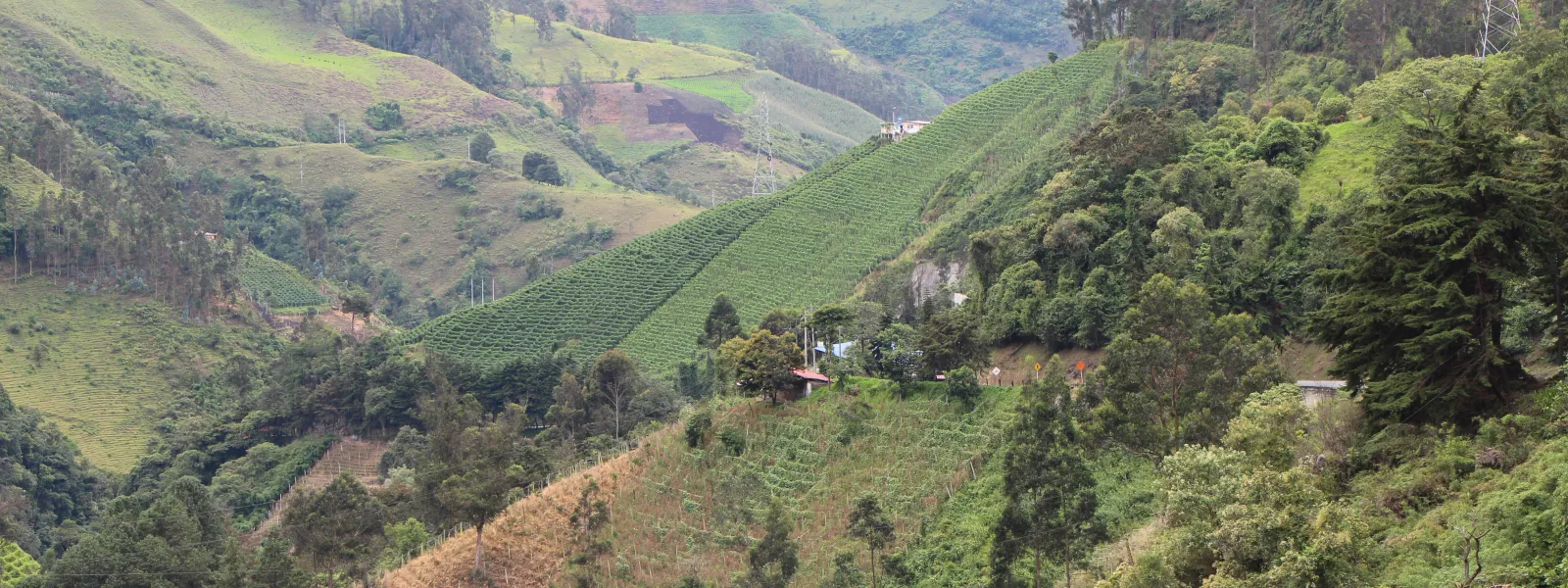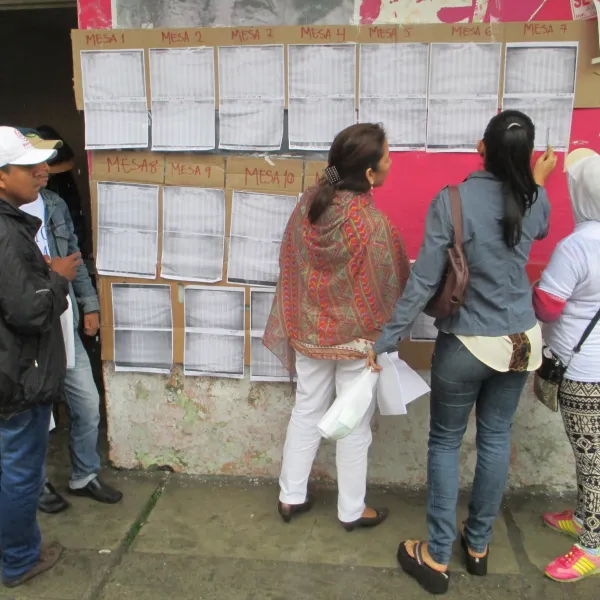
Project
Photo: Andrés Ángel / AIDASupporting Cajamarca’s fight to defend its territory from mining
Cajamarca is a town in the mountains of central Colombia, often referred to as "Colombia’s pantry” due to its great agricultural production. In addition to fertile lands, fed by rivers and 161 freshwater springs, the municipality features panoramic views of gorges and cloud forests. The main economic activities of its population—agriculture and tourism—depend on the health of these natural environments.
The fertile lands of Cajamarca are also rich in minerals, for which AngloGold Ashanti has descended on the region. The international mining conglomerate seeks to develop one of the world’s largest open-pit gold mines in the area. Open-pit mining is particularly damaging to the environment as extracting the metal involves razing green areas and generating huge amounts of potentially toxic waste
The project, appropriately named La Colosa, would be the second largest of its kind in Latin America and the first open-pit gold mine in Colombia. The toxic elements that an operation of that magnitude would leave behind could contaminate the soil, air, rivers and groundwater.
In addition, storms, earthquakes, or simple design errors could easily cause the dams storing the toxic mining waste to rupture. The collapse of similar tailings dams in Peru and Brazil in recent years has caused catastrophic social and environmental consequences.
On March 26, 2017, in a popular referendum, 98 percent of the voters of Cajamarca said “No” to mining in their territory, effectively rejecting the La Colosa project. AIDA is proud to have contributed to that initiative. But even with this promising citizen-led victory, much work remains.

Related projects
Wetlands: Vital and At Risk
Temporarily or permanently flooded extensions of land create wetlands— oxygen-deprived, hybrid ecosystems that combine the characteristics of both aquatic and terrestrial systems. Wetlands include marshes, páramos, bogs, peatlands, swamps, mangroves and coral reefs. Wetlands provide people with a host of benefits: Wetlands are natural supermarkets that contain an incredible amount of biodiversity: they are home to more than 100,000 known freshwater species. Our allies in the fight against climate change, wetlands capture and store carbon from the atmosphere. It is estimated that over long periods of time, a hectare of mangroves captures 50 times more carbon dioxide than a tropical forest. Wetlands help to reduce the risk of natural disasters . An example of this happened in 2011, when the Veracruz Reef System in the Gulf of Mexico protected the city of Veracruz from the category four Hurricane Karl. Wetlands are a source of livelihood and employment for millions of people. In Panama alone, 90 percent of incomefrom fishing comes from catching species that, at some stage in their life, depend on the wetlands of the Panama Bay. What’s more, water to irrigate the country’s 570 million agricultural crops comes from these ecosystems. By forming beautiful landscapes, wetlands are a center of recreational and tourist activities, such as bird watching. Under threat Even though they are one of the most productive ecosystems in the world, more than 64% of the world’s wetlands have disappeared. The causes of their degradation include: Activities like agriculture that promote changes in land use , and contribute to the loss of coverage of wetlands. An example is the Ciénaga Grande de Santa Marta in Colombia, which is at risk from agricultural practices that have affected its water supply. Poorly planned urban development like that which threatened Panama Bay, where the mangroves were filled in and cut down to construct roads and houses. Obstruction of the water flow that feeds wetlands, as in the construction of the Las Cruces hydroelectric project in Mexico on the San Pedro Mezquital river, on which Marismas Nacionales, one of the most important mangrove forests in the country, depends. Contamination of subterranean water sources by activities like mining. What can we do for them? At AIDA we work to protect wetlands in the Americas . We’ve advocated for the preservation of the Colombian páramosand the Mexican wetlands, such as Cabo Pulmo, Marismas Nacionales and the Veracruz Reef System. We’ve also created rigorous reports about the international legal obligations that Costa Rica must meet to protect its corals, and about the standards of protection of corals in Mexico. And we’re ready to do more! We are currently preparing for the 12th Conference of Parties (COP12) for the Ramsar Convention , an intergovernmental treaty that has since 1971 promoted the protection of wetlands and established principles for their conservation and sustainable use through national action and international cooperation. The countries that sign and ratify the Convention are home to wetlands on the Ramsar List. They commit to taking steps necessary to maintain the ecological characteristics of these sites , which hold such significant value for their country and for all of humanity. The Conference will put to the test the promises that Latin American countries have made to protect their wetlands. The Parties will release Strategic Plan 2016-2021 , which will lay the foundation for the conservation of these ecosystems in the region. We’ll be at the Conference alongside partner organizations and decision markers to advocate for the best possible preservation of these beacons of health and biodiversity for the region.
Read morePáramos: Defending Water in Colombia
Colombia’s páramos occupy just 1.7 percent of the national territory, yet they produce 85 percent of its drinking water. These rich sources of life are threatened by activities like large-scale mining, and their protection should be a point of national interest. So just how does the magic happen? The páramos are high altitude wetlands. Despite being located in the equatorial zone, they remain cool throughout the year, which enables their soils to maintain rich volcanic nutrients. All these characteristics make the páramos true sponges that capture moisture from the atmosphere, purify water and regulate its flow. The growth of the economy, the production of electricity and life itself are all made possible by the water provided by Colombia’s páramos: Bogota’s water comes from the páramos of Sumpaz, Chingaza (at risk) and Cruz Verde (at risk from mining exploration). The water in Medellin arrives from the páramo of Belmira. The Santurbán páramo (at risk from gold mining projects) supplies water to Bucaramanga. In Cali, the Farallones are vital springs of water. Life in all these cities depends on the páramos. That’s why AIDA is committed to the protection of these valuable ecosystems. It’s about defending our sources of fresh water, our right to live. This fight recently called us to: Call the World Bank’s attention to the risks of its investment in the Angostura mine, in the Santurbán páramo, which would harm both people and the environment. Co-organize a seminar about páramos and mining at the Universidad Sergio Arboleda in order to discuss and understand the latest legal and technical regulations on the subject. We Are Not Alone Social movements in defense of water, life and páramos have blossomed across the country. The Committee for the Defense of Water and the Santurbán Páramo and the Committee for Cruz Verde are two strong examples. Greenpeace Colombia has also promoted the end of mining in the Pisba páramo in Boyacá. Meanwhile, after many extensions, the Environmental Minister announced last December the delimitation of the Santurbán páramo. However, he also announced that mining projects that already had a title and an environmental license would be permitted to continue. The Canadian mining company Eco Oro then issued a public statement that, even with the delimitation of Santurbán, it would continue developing the Angostura mine on a smaller scale. This delimitation opens the way for similar actions on which the recognition and protection of other Colombian páramos will depend. As members of civil society we must remain vigilant so that such actions comply with national and international environmental and human rights standards. Our water, and therefore our life, is at risk. Where will our fresh water come from in 2015, when our numbers are millions more? If we don’t protect our páramos today, Colombia’s future generations will be deprived of access to water. Current problems in Lima, Peru and São Paulo, Brazil remind us that this reality might not be too far away.
Read morePáramos: Defending Water in Colombia
Colombia’s páramos occupy just 1.7 percent of the national territory, yet they produce 85 percent of its drinking water. These rich sources of life are threatened by activities like large-scale mining, and their protection should be a point of national interest. So just how does the magic happen? The páramos are high altitude wetlands. Despite being located in the equatorial zone, they remain cool throughout the year, which enables their soils to maintain rich volcanic nutrients. All these characteristics make the páramos true sponges that capture moisture from the atmosphere, purify water and regulate its flow. The growth of the economy, the production of electricity and life itself are all made possible by the water provided by Colombia’s páramos: Bogota’s water comes from the páramos of Sumpaz, Chingaza (at risk) and Cruz Verde (at risk from mining exploration). The water in Medellin arrives from the páramo of Belmira. The Santurbán páramo (at risk from gold mining projects) supplies water to Bucaramanga. In Cali, the Farallones are vital springs of water. Life in all these cities depends on the páramos. That’s why AIDA is committed to the protection of these valuable ecosystems. It’s about defending our sources of fresh water, our right to live. This fight recently called us to: Call the World Bank’s attention to the risks of its investment in the Angostura mine, in the Santurbán páramo, which would harm both people and the environment. Co-organize a seminar about páramos and mining at the Universidad Sergio Arboleda in order to discuss and understand the latest legal and technical regulations on the subject. We Are Not Alone Social movements in defense of water, life and páramos have blossomed across the country. The Committee for the Defense of Water and the Santurbán Páramo and the Committee for Cruz Verde are two strong examples. Greenpeace Colombia has also promoted the end of mining in the Pisba páramo in Boyacá. Meanwhile, after many extensions, the Environmental Minister announced last December the delimitation of the Santurbán páramo. However, he also announced that mining projects that already had a title and an environmental license would be permitted to continue. The Canadian mining company Eco Oro then issued a public statement that, even with the delimitation of Santurbán, it would continue developing the Angostura mine on a smaller scale. This delimitation opens the way for similar actions on which the recognition and protection of other Colombian páramos will depend. As members of civil society we must remain vigilant so that such actions comply with national and international environmental and human rights standards. Our water, and therefore our life, is at risk. Where will our fresh water come from in 2015, when our numbers are millions more? If we don’t protect our páramos today, Colombia’s future generations will be deprived of access to water. Current problems in Lima, Peru and São Paulo, Brazil remind us that this reality might not be too far away.
Read more